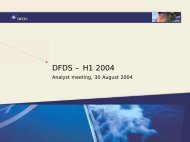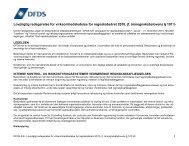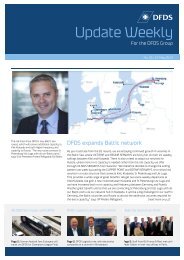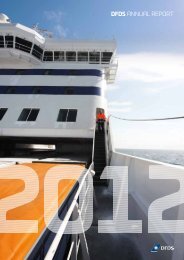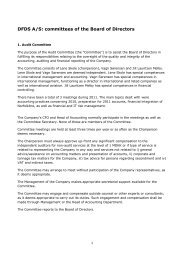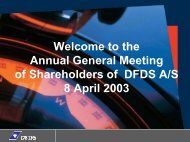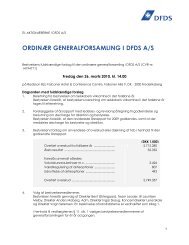English - DFDS
English - DFDS
English - DFDS
Create successful ePaper yourself
Turn your PDF publications into a flip-book with our unique Google optimized e-Paper software.
<strong>DFDS</strong> annual report 2009 NOTEs 107<br />
Note 40<br />
Critical accounting estimates and judgements<br />
When preparing the annual report for the Group, <strong>DFDS</strong>’ management makes a number of accounting estimates and assessments to recognise and measure the Group’s<br />
and the parent company’s assets, liabilities, income and expenses. The most significant accounting estimates and assessments are mentioned below.<br />
Valuation of non-current intangible assets<br />
Impairment tests of goodwill and other non-current intangible assets, which primary relates to customer portfolios/-relations, are made annually as a minimum. Impairment<br />
tests are based on the expected free cash flow from the cash generating unit in question. For further description of impairment tests of goodwill and other non-current<br />
intangible assets, view Note 39.<br />
Estimated useful life, residual values and impairment tests of ships<br />
Significant accounting estimates regarding ships include, among other things, estimates of useful life (including decomposing), residual value and impairment tests. The useful<br />
life and the residual values of the ships within the Group are estimated annually as a minimum. Furthermore the carrying amounts of the ships are tested for impairment<br />
annually as a minimum. Material changes in estimated useful life as well as residual value and the result of the impairment tests can affect the profit for the year.<br />
Accounting Policies and methods regarding critical estimates regarding estimated useful life, residual values and impairment tests of ships are described in Note 1 and Note 39.<br />
Allowances for doubtful trade receivables<br />
Trade receivables are stated at amortised cost less allowances for potential losses on doubtful trade receivables.<br />
Allowances for doubtful trade receivables are estimated taking the inability of the customers to make required payments into account. If the ability of the costumers<br />
to make required payments were to deteriorate, additional allowances may be required in future periods. Management performs analyses on the basis of customers’<br />
expected ability to pay, historical information on payment patterns and doubtful debts, customer concentrations and customers’ creditworthiness and collateral received<br />
when estimating whether write-downs made are sufficient to cover losses.<br />
It is estimated that the allowances are sufficient for covering losses on doubtful trade receivables.<br />
Pensions and similar liabilities<br />
The Groups defined benefit schemes are estimated based on a number of material actuarial assumptions, including discount rates, expected return on the schemes assets,<br />
expected rates for salary, pension increase and death-rate etc. Even modest changes to the assumptions may significant change the pension liability.<br />
The value of the Groups defined benefit schemes are based on calculations from external actuaries.<br />
Deferred tax assets<br />
Deferred tax assets, including tax deficit carried forward, are recognised to the extent that it is estimated that the tax assets can be realised through future positive<br />
income within the foreseeable future.<br />
Provisions and contingent liabilities<br />
The management assess the provisions and contingent liabilities and the probable outcome of pending and possible lawsuits etc. The outcome is dependent on future<br />
events which of nature are uncertain. By the assessment of the most probable outcome of material lawsuits, taxable conditions etc. the management involves external<br />
legal advisors and outcomes from case law.<br />
Note 41<br />
Events after the balance sheet date<br />
At the extraordinary general meeting held on 11 January 2010 it was adopted to increase <strong>DFDS</strong>’ share capital by a nominal total of DKK 540 million in conjunction with<br />
a cash pre-emptive rights issue and to increase the share capital by at least a nominal DKK 310 million and up to a maximum DKK 530 million by way of a directed rights<br />
isssue to A. P. Moller – Maersk, and without pre-emptive subscription rights for shareholders. Please see Company Announcement No. 1/2010.<br />
On 25 January 2010 CEO Niels Smedegaard received a share option of 10,000 shares and CFO Torben Carlsen a share option of 15,750 shares.<br />
On 8 February 2010 an agreement is entered concerning the charter of the passenger ship QUEEN OF SCANDINAVIA for a three year period from 15 April 2010.<br />
The agreement includes purchase options and all terms of the agreement have been fulfilled. The charter agreement is entered into with Inflot Cruise and Ferry Ltd.<br />
headquartered in St. Petersburg, Russia. QUEEN OF SCANDINAVIA is to be deployed on a new route between St. Petersburg and Helsinki in Finland.<br />
On 12 February 2010 the Supreme Court in Norway made the decision that the charge of tax concerning the transition to the new regulation of tonnage tax in 2007<br />
was against the Norwegian constitution. See Note 26.<br />
Beside the above there have not been any significant events after 31 December 2009.



